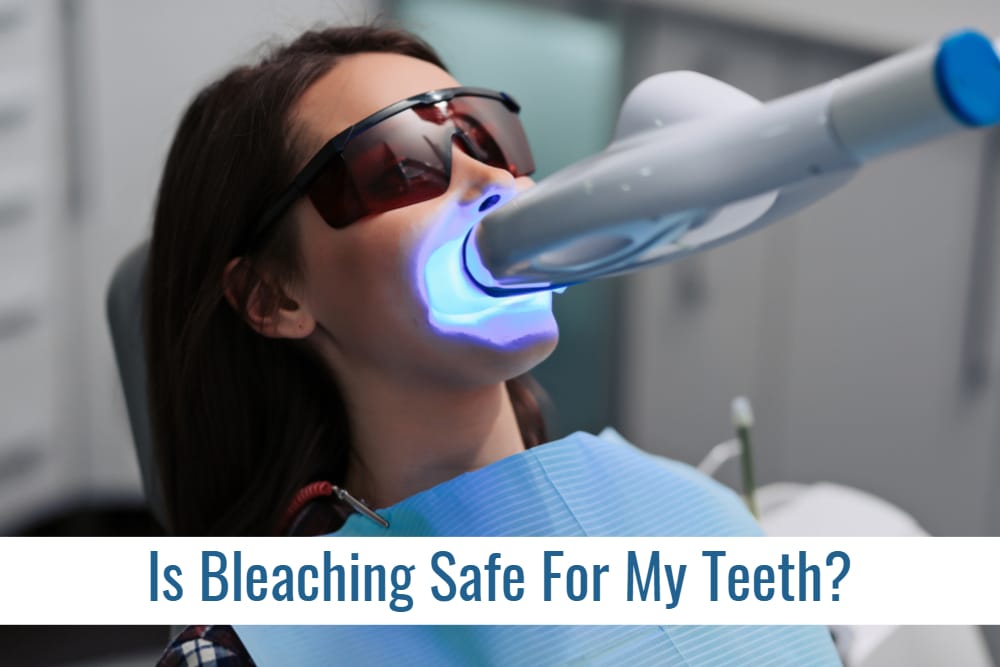
Bright white smiles gleam from advertisements, movies, and TV shows. With the constant bombardment of idealized bleached smiles, it is not surprising that many people are interested in whitening their teeth.
However, a common concern is how safe it is to bleach your teeth. The thing is, the safety—and effectiveness of teeth whitening—depends on a variety of factors.
Certain Types Of Teeth Whitening Are Safer Than Others
It is easy to get your hands on an over-the-counter teeth bleaching kit. Previously, the main concerns of using these kits are their lower effectiveness in whitening your teeth, the tooth sensitivity a kit can cause, and how over-bleaching can cause your gums to bleed. However, recent research has shed some light on further concerns.
Previously, researchers looked to see if bleaching hurt the enamel—the protective outer layer of your tooth—and the answer was that teeth whitening treatment caused no permanent damage. But in a recent study, scientists studied the entire tooth and noted that the major protein structure in the dentin was broken down by bleaching.
As the dentin is the sensitive layer found directly under the enamel, it is a problem if the structure is compromised. In the study, over-the-counter teeth whitening strips were specifically mentioned as being problematic.
This study highlights the importance of having a dentist monitors your teeth whitening. Not only is professional teeth whitening far faster than over-the-counter kits, but our dentists here at Riverside Dental Care can ensure that your teeth stay healthy as your teeth are bleached.
When Is Bleaching Less Effective?
Bleaching your teeth may not always work, depending on why your teeth are no longer white. Those individuals who have yellow teeth can usually benefit from teeth whitening, as their teeth are simply yellowed with age.
People with grey teeth, who have a dead tooth—or several dead teeth—or have brown stains may not find whitening effective, as these deeper stains can be hard to address. Veneers are a better option if your teeth cannot be bleached.
Also, it is essential to remember that if you have tooth-colored fillings, crowns, bonding, or veneers, they will not be whitened when your teeth are bleached.
How To Tell If Teeth Bleaching Is A Good Option For You
There are many things to consider when it comes to whether or not bleaching is safe for your teeth. Rather than risk your dental health, here are some things you can do to find out if bleaching is—or is not—the right choice for your dental health.
- Consult with our dentists – To ensure that you don’t waste your time and money on teeth whitening products, you can work directly with our dentists to bleach your teeth. In just one in-office visit, you can leave with visibly whiter teeth. And, by talking to our dentists first, you can find out if you are a good candidate for teeth whitening.
- Practice good oral hygiene – Surface staining can easily be taken care of with regular teeth brushing and biannual dental cleanings with our dental staff. Don’t brush too hard, as that can actually damage the enamel of your teeth. Instead, just be sure to brush once in the morning and evening, floss, and use mouthwash to help reduce the staining of your teeth.
- Other dental issues are resolved – Last, but not least, it is important to have any existing dental problems addressed before having your teeth whitened. If you have cavities, periodontal disease, or other oral health issues, the solutions used to whiten your teeth can cause heightened sensitivity and discomfort. So, by working with our dentists, any dental issues can be found and resolved so that your teeth are ready to be bleached.
If you are interested in professional teeth whitening services, feel free to contact us to set up a consultation with one of our experienced dentists. That way, we can help you achieve your dream smile!



Leave a Reply